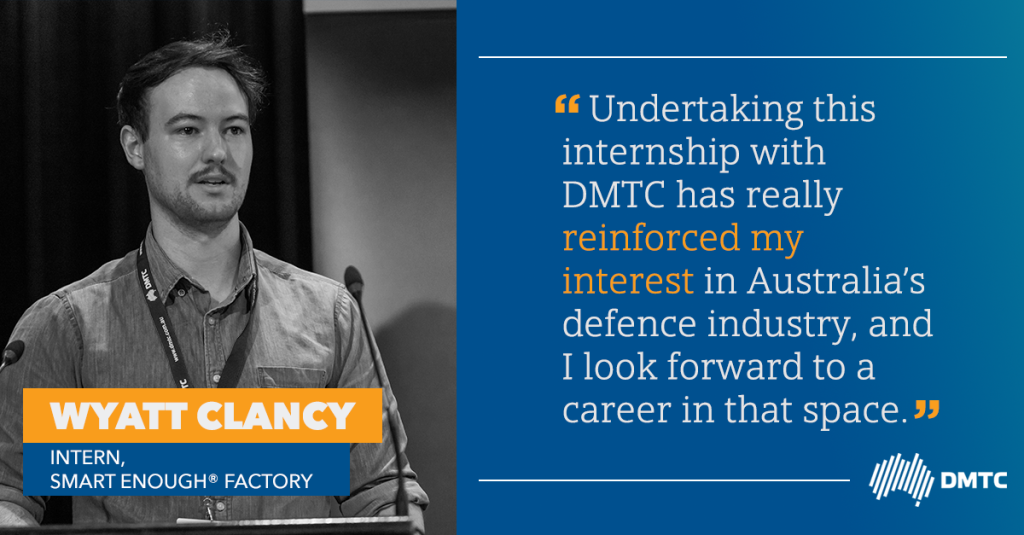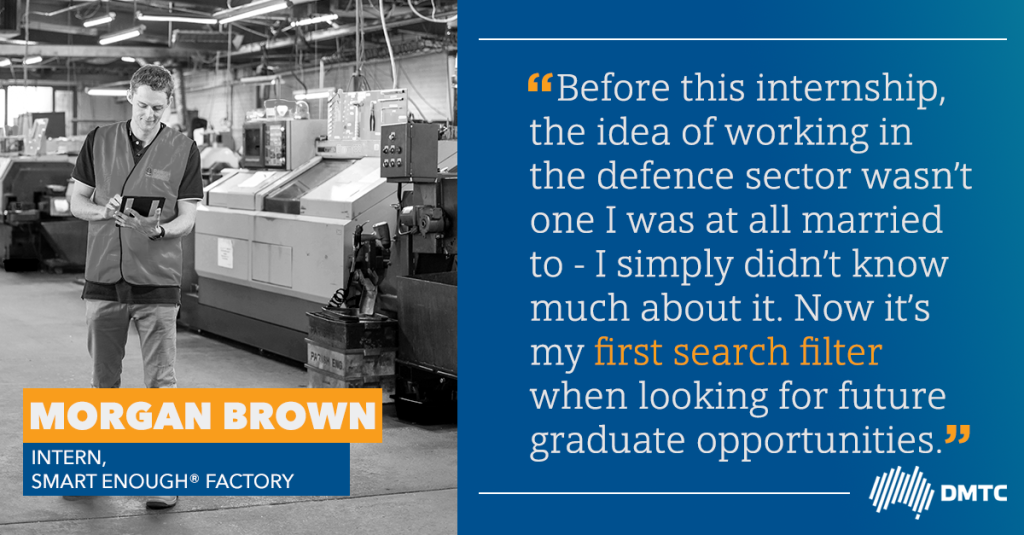Interns Propel Defence SMEs Forward with Industry 4.0 Toolkit
Australia’s defence industry is grappling with the rapid evolution of technology. But despite the challenges posed, opportunities abound for companies, big and small, to enhance their international competitiveness, efficiency and workforce outcomes. One of a number of ways DMTC is bolstering Australia’s sovereign industrial base is by equipping Australian small and medium-sized enterprises (SME) to leverage Industry 4.0 technologies. DMTC’s Education program reinforces this objective by exposing undergraduate engineering, computer science and software development students to work experience supporting these SMEs as they seek to digitise their manufacturing operations.
With support from the Defence Science Institute (DSI) and Australian Industry Group (AI Group), DMTC has facilitated numerous internships for third or fourth-year undergraduate students. The interns are a critical part of the DMTC team delivering the Smart Enough® Factory (SEF) program. DMTC invited Morgan Brown and Wyatt Clancy, two interns from our SEF cohorts, to share their thoughts on the internship experience. It’s clear that participation in the program has sparked interest in pursuing future roles within Australia’s defence industry.
Commencing their roles as interns for SEF cohorts 5 and 6 respectively, Wyatt and Morgan acknowledge they felt a blend of excitement and anticipation, combined with a general curiosity about Defence and the role small manufacturers play in strengthening Australia’s national security. These questions were soon answered when the pair began work on their assigned company’s digital transformation journeys.
Describing the role of an intern within the SEF project, Morgan says that it is all about assisting SMEs to bridge the gap between data and actionable insights: “To someone unfamiliar with Industry 4.0, I’d describe my work with DMTC’s Smart Enough® Factory as helping to transform data from pen and paper, or rows of numbers, to graphs on a dashboard screen that are sensible enough for humans to make sense of.” By aiding local small businesses with the tools (and mindset) necessary to leverage the SEF Factory in a Box Kit and translate raw data into intelligible performance metrics, interns play a critical role in enhancing the digital practices of participating companies, often working directly from the factory floor.
This is made easy, Wyatt notes, due to the Factory in a Box Kit striking the right balance between embracing digital disruption on one hand and usability on the other – the Kit is “designed to be simple enough to use, even for individuals without an engineering or ICT background.” According to Wyatt, this is a real benefit. The accessibility of this tool enables anyone, regardless of expertise, to contribute to their organisation’s Industry 4.0 capabilities, eliminating the expertise barriers that commonly hold back small-scale digitisation efforts.

More than another internship
DMTC’s Education program encompasses more than just work experience. It invests in the workforce needed to support Australia’s future industrial base by placing strong emphasis on broad professional development and networking opportunities.
During their internships, both Morgan and Wyatt attended the Australian International Airshow held in Avalon, as well as DMTC’s own Annual Conference held in Canberra. As part of DMTC’s Annual Conference, Wyatt even shared insights from his internship experience with a large and diverse audience, presenting to representatives from across government, industry and the university sectors.
Morgan speaks for both interns when asked to reflect on the broader impact of his internship experience: “working with the businesses involved, in addition to gaining a broader perspective of Defence, was a real pleasure…the technology being developed, the anecdotal wisdom shared, and the manufacturing excellence observed will undoubtedly shape my professional development.”
Building on this, Wyatt felt his internship was especially meaningful given he assisted a cohort of companies based in regional Victoria. This allowed him to recognise the importance of digitisation to promoting resilient and diversified regional businesses, and brought to light the distinct challenges – such as workforce security – that confront SMEs across the regions.
Championing Australia’s Future Defence Workforce
Sam McNaughton, General Manager for SEF delivery partner Defence Industry Advisory Services (DIAS), is of the view that the Defence Industry has much to gain from working with interns. “Our experience on the Smart Enough® Factory project has demonstrated the importance of capability and capacity that team members like Morgan and Wyatt bring to the program. Industry often lacks the digitisation experience and capacity to deliver continuous improvement projects in addition to business-as-usual operational demands, so an intern can be a tremendous asset to an SME. Importantly, exposing interns such as Morgan and Wyatt to real-world business problems is critical to prepare them for a role in industry once they graduate.”
When asked about the benefits of their experience, both Morgan and Wyatt express newfound ambitions to pursue careers in Australia’s advanced manufacturing and defence sectors. For Wyatt, his time as an SEF intern solidified his interest in collaborating with Australian defence companies, telling DMTC that he is “looking forward to a career in this space.” As for Morgan, the experience has broadened his appreciation for the breadth and complexity of the defence landscape, and has had a big impact on his career aspirations: “Before this internship, the idea of working in defence wasn’t one I was at all married to – I simply didn’t know much about it. Now it’s my first search filter when looking for future graduate opportunities.”
Posted by Patrick Crosling on February 1st, 2024